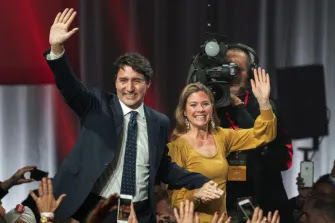Conservative leader Andrew Scheer was
unable to generate enough enthusiasm among voters to win the seats
required to form government.
The Conservatives’ pledge to repeal the
country’s carbon tax failed to resonate with voters in the electorally
important suburbs of Ontario and Quebec.
In his victory speech Trudeau said that he had heard the frustration of Canadians who did not support his party.
“We will govern for everyone regardless of how you cast your ballot,” he said.
“We seek hardship for none and prosperity for all – that is the world we are working towards.”
US President Donald Trump, who has had an often tense relationship with Trudeau, tweeted: “Congratulations to @JustinTrudeau on a wonderful and hard fought victory. Canada is well served. I look forward to working with you toward the betterment of both of our countries!”
In his concession speech Scheer predicted that Trudeau’s second term would be short-lived and pointed out that his party won more votes than the Liberals.
“We will govern for everyone regardless of how you cast your ballot,” he said.
“We seek hardship for none and prosperity for all – that is the world we are working towards.”
US President Donald Trump, who has had an often tense relationship with Trudeau, tweeted: “Congratulations to @JustinTrudeau on a wonderful and hard fought victory. Canada is well served. I look forward to working with you toward the betterment of both of our countries!”
In his concession speech Scheer predicted that Trudeau’s second term would be short-lived and pointed out that his party won more votes than the Liberals.
“Tonight Conservatives have put Justin Trudeau on notice,” he said to applause from party loyalists.
“And Mr Trudeau when your government falls Conservatives will be ready and we will win … We are the government in waiting.”
The polls, which in the final days of the campaign suggested a narrow victory for the Liberals, turned out to be accurate.
The Bloc Québécois, a party devoted to Quebec nationalism, picked up a substantial number of seats in that province, denying the Liberal Party the seats required to form government in its own right.
The Bloc Québécois, a party devoted to Quebec nationalism, picked up a substantial number of seats in that province, denying the Liberal Party the seats required to form government in its own right.
The Liberals are forecast to win 156 seats, down from 184 in the past
election and short of the 170 needed to win a parliamentary majority.
The Conservatives are expected to win 122 seats, the Bloc Québécois 32 seats and the left-wing New Democrats 23 seats.
The Green Party won three seats.
The Conservatives narrowly won the popular vote with 34 per cent, ahead of the Liberals on 33 per cent and the New Democrats on 15 per cent. But they did not pick up votes in the urban areas where they needed to make significant gains under the country’s first-past-the-post electoral system.
After winning power four years ago, Trudeau created a gender-balanced cabinet and legalised assisted dying and recreational marijuana.
The Conservatives are expected to win 122 seats, the Bloc Québécois 32 seats and the left-wing New Democrats 23 seats.
The Green Party won three seats.
The Conservatives narrowly won the popular vote with 34 per cent, ahead of the Liberals on 33 per cent and the New Democrats on 15 per cent. But they did not pick up votes in the urban areas where they needed to make significant gains under the country’s first-past-the-post electoral system.
After winning power four years ago, Trudeau created a gender-balanced cabinet and legalised assisted dying and recreational marijuana.
The economy has performed strongly since his 2015 victory, with unemployment at 5.5 per cent.
But Trudeau has recently been dogged by scandals, especially the so-called SNC-Lavalin affair.
In August the Canadian Parliament’s ethics commissioner found that Trudeau improperly influenced the then minister of justice and attorney-general to intervene in a criminal case against SNC-Lavalin, a Quebec-based construction company.
The affair led to the downfall of two cabinet ministers and Trudeau’s top advisor.
Earlier this year Trudeau’s approval ratings sank to 28 per cent, significantly lower than Trump’s.
But Trudeau has recently been dogged by scandals, especially the so-called SNC-Lavalin affair.
In August the Canadian Parliament’s ethics commissioner found that Trudeau improperly influenced the then minister of justice and attorney-general to intervene in a criminal case against SNC-Lavalin, a Quebec-based construction company.
The affair led to the downfall of two cabinet ministers and Trudeau’s top advisor.
Earlier this year Trudeau’s approval ratings sank to 28 per cent, significantly lower than Trump’s.
“He can’t even remember how many times he put blackface on, because
the fact of the matter is he’s always wearing a mask,” Scheer said
during a campaign leaders’ debate.
The Conservatives tried to capitalise on Trudeau’s unpopularity, but failed to expand support beyond their base in western Canada.
Speaking to supporters on Monday night, Bloc Québécois leader Yves-François Blanchet ruled out forming a coalition government with either major party.
But he said his party would work together on policies that improve life for Quebec’s residents.
“This is a Parliament we will have to make work,” he said.
The Conservatives tried to capitalise on Trudeau’s unpopularity, but failed to expand support beyond their base in western Canada.
Speaking to supporters on Monday night, Bloc Québécois leader Yves-François Blanchet ruled out forming a coalition government with either major party.
But he said his party would work together on policies that improve life for Quebec’s residents.
“This is a Parliament we will have to make work,” he said.
New Democrat leader Jagmeet Singh said
his party did not achieve the results it wanted but would “play a
constructive and positive role in the new government that Canadians have
chosen”.
https://www.theage.com.au/world/north-america/justin-trudeau-wins-second-term-as-canadian-prime-minister-20191022-p5332k.html?fbclid=IwAR107nM3AKeACWOjy7yMH-k8yOLSwZT3Y67YBbUPprsvpYzUwTns46HKkVs
https://www.theage.com.au/world/north-america/justin-trudeau-wins-second-term-as-canadian-prime-minister-20191022-p5332k.html?fbclid=IwAR107nM3AKeACWOjy7yMH-k8yOLSwZT3Y67YBbUPprsvpYzUwTns46HKkVs




No comments:
Post a Comment
Note: Only a member of this blog may post a comment.